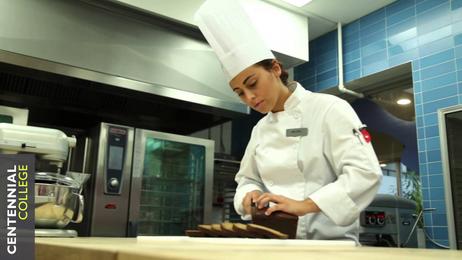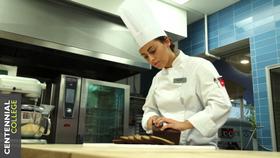If the combination of flour, sugar, and eggs delight you, then it may be time to consider a career in baking! Today’s community colleges offer specialized baking and pastry arts programs that are perfect for budding culinary artists. Whether you want to start your own bakery or work as the head pastry chef for a five-star restaurant, you can knead your start right at your local community college.
A Career in Baking and Pastry Arts
A Growing Field
Some Americans looking to find new job prospects in these challenging economic times are finding that an age-old skill – preparing delicious food for others to eat – may be the answer to their modern-day job search. An increasing number of community colleges offer training programs that are specially designed for students who would like to embark upon lucrative careers as bakers and pastry chefs. Fortunately for those who love to create delicious baked goods, the job market for professional bakers and pastry chefs appears to be thriving. With proper training and certification, an amateur baker can turn himself or herself into a well-paid professional culinary artist.
What Bakers and Pastry Chefs Do
A pastry chef develops recipes and prepares desserts, which may include cakes, pies, cookies, breads, rolls, sauces, glazes, custards, pastries, and candies. Pastry chefs often work for upscale restaurants, hotels, private clubs, and catering companies. They may also work in retail or wholesale bakeries. The National Restaurant Association reports that in a larger restaurant or bakery, a pastry chef may be responsible for pastries and candies only, while in a smaller establishment, a pastry chef is often responsible for all baked goods.
A baker is usually the term used for a person who works under a pastry chef in a restaurant or pastry shop.
Average Earnings
Chefs and head cooks earned a median annual salary of $34,370 as of May 2006, according to the U.S. Bureau of Labor Statistics. Other restaurant cooks earned a median annual salary of $20,340 according to the same report. Earnings will vary by geographical region. For example, the salary survey website PayScale.com reports that a pastry chef in Austin, TX can expect to earn between $29,000 and $40,000 per year, while a pastry chef in New York City can expect an annual salary of between $36,000 and $65,000.
Job Prospects
The U.S. Bureau of Labor Statistics reports that job openings for chefs, cooks, and food preparation workers (including bakers and pastry chefs) are expected to be plentiful through 2016, due to increasing numbers of people choosing to dine in restaurants and purchasing prepared foods from grocery stores. Pastry chefs and bakers make up a particular sub-set of culinary artists that will likely be in demand in coming years, especially as the market for prepared foods in grocery and specialty stores continues to grow.
Starting Your Baking Career at Community College
Certificate and Degree Programs
Those who wish to be competitive in the pastry chef job market often choose to complete a degree or certificate program in baking or culinary arts. There are several certifications or degrees available:
- A certificate in Baking and Pastry Arts, such as the one offered by the State University of New York’s Erie Community College.
- An Associate of Science Degree (A.S.) in Pastry and Specialty Baking, such as the one offered by South Seattle Community College in Washington.
- An Associate of Science Degree (A.S.) in the general field of Culinary Arts, such as the one offered by the State University of New York’s Schenectady Community College. This type of program will include some instruction in baking, but will also delve into other types of culinary skills.
A program leading to an A.S. degree will usually take two years to complete, while a program for a certificate in Baking and Pastry Arts will usually take one year to complete, assuming that a student enrolls on a full-time basis.
Some two-year programs may lead to an A.A.S. or A.O.S. degree rather than an A. S. degree. A.A.S. stands for Associate in Applied Science, while A.O.S. stands for Associate in Occupational Science. There is little difference between an A.A.S., A.O.S., and A.S. in terms of future job prospects or marketability.
What You’ll Learn in a Baking and Pastry Program
The community college courses that you take to earn a certificate in Baking and Pastry Arts will almost certainly involve a great deal of hands-on experience. In other words, you should expect to find yourself in the kitchen frequently and enjoying lots of baking! A good program will include a course on food safety and sanitation. Training programs may also offer courses in:
- Nutrition
- Purchasing and inventory methods
- Math for hospitality workers
- Specific types of baked goods. For example, the certificate program at South Seattle Community College offers courses in pies, breads, chocolate, petit fours, French pastries, cakes, and cookies.
Some programs also offer students opportunities to gain hands-on experience in the world of professional baking by completing internships in commercial baking environments. The Baking and Pastry Arts Certificate Program at SUNY’s Erie Community College even requires that students complete 100 hours of “field experience” in a commercial baking business, such as a retail bake shop, upscale restaurant, or larger wholesale bakery.
To Learn More
The American Culinary Federation maintains a list of post-secondary training programs that are it has accredited. Whether you choose a certificate or associate’s program at your local community college, happy baking!















